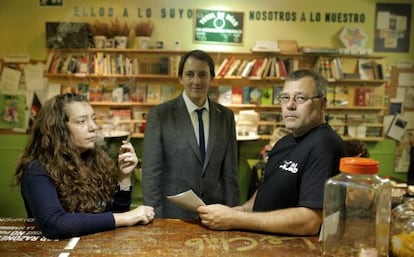Marijuana joins the campaign fray
Podemos, Ciudadanos and United Left support regulating cannabis for therapeutic use The ruling Popular Party, however, is completely opposed to such a measure

Just weeks after Mexico’s Supreme Court ruled to let four citizens grow and consume marijuana for recreational purposes, around 50 Spanish associations are asking Spain’s political parties to open up a national debate on the same issue.
The request, made by an umbrella group called Regulación Responsable (Responsible Regulation), comes with less than a month to go before Spain holds general elections where, for the first time, voters are expected to break the longstanding two-party hegemony enjoyed by the Popular Party (PP) and the Socialists (PSOE).
Our goal is to include the issue on the political agenda, and for the debate to reach Congress next year”
“Our goal is to include the issue on the political agenda, and for the debate to reach Congress next year,” explains Bernardo Soriano, a lawyer and member of the pro-cannabis group. “The idea is to have legislation in place by 2017 regulating the growing, distribution and use of cannabis for therapeutic and recreational uses.”
The emerging parties Ciudadanos and Podemos both support regulation, as does the leftist coalition United Left. The Socialists say they are ready to open up a debate, while the ruling PP openly opposes it.
In Spain, nine percent of the population are regular cannabis consumers – a figure that reaches 17 percent among 15- to 34-year-olds, according to the Health Ministry’s Plan Against Drugs (PAD).
Although consuming marijuana or hashish inside a private space is not a crime in Spain, being in possession of it, or selling it, is.
“Carrying a joint in your pocket and being caught on the street can mean a €600 fine; although it is not illegal to sell marijuana seeds, it is illegal to plant them in the earth to make them germinate. But growing it for self-consumption is not punishable, either,” says Pedro Pérez, founder of La Santa Le Club, one of Spain’s 800 cannabis clubs, to illustrate the contradictions inherent in Spain’s current legislation.
Pérez talks about the “urgent need” for a comprehensive law covering every aspect of marijuana possession and consumption.
“The way things stand now, you give a youngster €50 and he’ll sooner bring you a bag of dope than a bottle of whiskey. Why? Because the sale of alcohol is regulated, while cannabis can be bought on the street with no control.”
Clubs like La Santa Le Club began flourishing 15 years ago on the back of shared consumption doctrine, which the Supreme Court has recently cast doubts over by ruling against a cannabis club in Bilbao. This decision, which contradicts many earlier rulings recognizing the right to shared consumption, has triggered the preventive closure of many clubs. “We ourselves have stopped selling marijuana,” says Pérez.
While the world advances toward regulation, Spain is moving in the opposite direction”
“The Supreme Court ruling is implicitly asking the legislative branch of government to regulate a controversial social issue that cannot be channeled through jurisprudence,” adds Soriano, who is the legal representative for more than 100 clubs.
“Prohibitionist policies are increasingly being questioned, but while the world advances toward regulation, Spain is moving in the opposite direction,” says Jorge Moruno, a representative for the left-wing party Podemos. “Around 52 percent of the Spanish population supports controlled sales and private consumption for adults, according to a study by the Foundation to Help Fight Drug Addictions. That’s another reason to legislate with courage and maturity.”
Fran Hervías, organization secretary for Ciudadanos, shares the view that cannabis should be the subject of a law, although he adds that “we’re not talking about a soft drugs free-for-all.”
But José Ignacio Echániz, a health official with the PP, says that all these “election-time offers” reflect “a complete lack of responsibility.”
“There is nothing to regulate because it’s already regulated. Liberalization affects all of society, not just adults who consume cannabis,” he says. “On this subject, the common good must prevail over everything else.”
Francisco Babín, the head of the National Plan Against Drugs, agrees and says that he is observing a widespread social banalization of the effects of cannabis even though “it is the main cause of teenage admission into the emergency room for psychological episodes.”
But his predecessor, Araceli Manjón-Cabeza, who spent 20 years defending repressive policies, now defends regularization.
“It is preferable for substances such as cannabis to be supplied by the state than by Chapo Guzmán,” she said, in reference to a notorious Mexican drug lord.
Manjón-Cabeza is supporting Regulación Responsable, whose proposal is based on five main points: regulation of cannabis growing, possession and consumption for personal purposes; distribution through cannabis clubs; licensed commercialization; prevention policies and risk reduction based on education; and access to medicinal cannabis through the health system.
The debate has reached the campaign stage. December 20 will provide the answers.
English version by Susana Urra.
Tu suscripción se está usando en otro dispositivo
¿Quieres añadir otro usuario a tu suscripción?
Si continúas leyendo en este dispositivo, no se podrá leer en el otro.
FlechaTu suscripción se está usando en otro dispositivo y solo puedes acceder a EL PAÍS desde un dispositivo a la vez.
Si quieres compartir tu cuenta, cambia tu suscripción a la modalidad Premium, así podrás añadir otro usuario. Cada uno accederá con su propia cuenta de email, lo que os permitirá personalizar vuestra experiencia en EL PAÍS.
¿Tienes una suscripción de empresa? Accede aquí para contratar más cuentas.
En el caso de no saber quién está usando tu cuenta, te recomendamos cambiar tu contraseña aquí.
Si decides continuar compartiendo tu cuenta, este mensaje se mostrará en tu dispositivo y en el de la otra persona que está usando tu cuenta de forma indefinida, afectando a tu experiencia de lectura. Puedes consultar aquí los términos y condiciones de la suscripción digital.








































